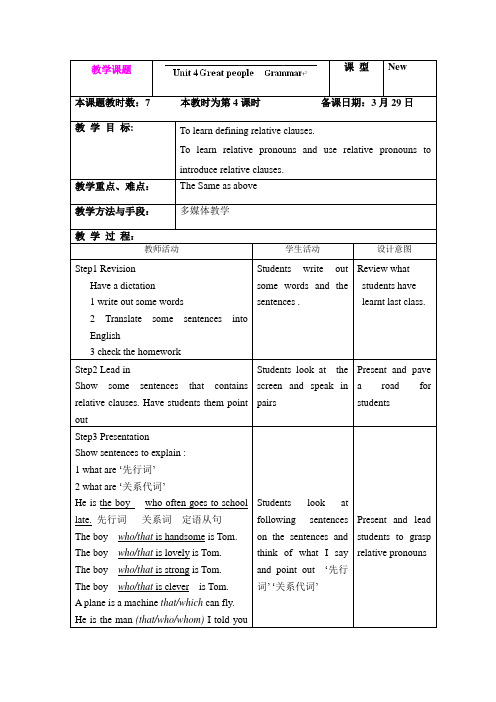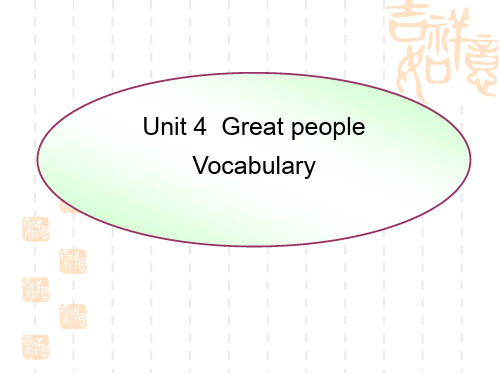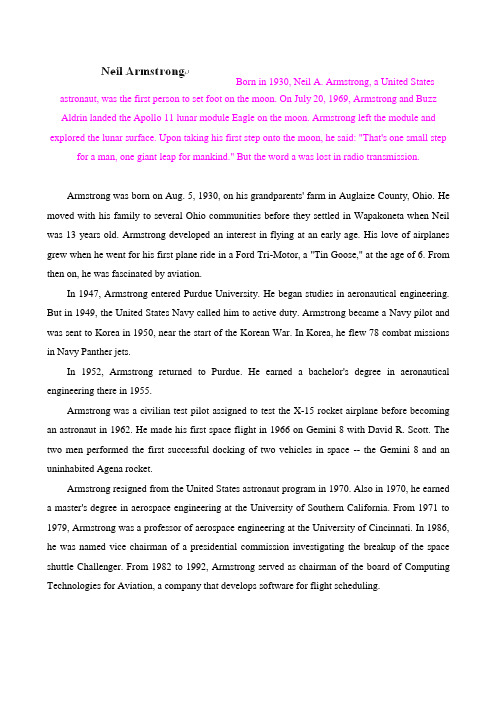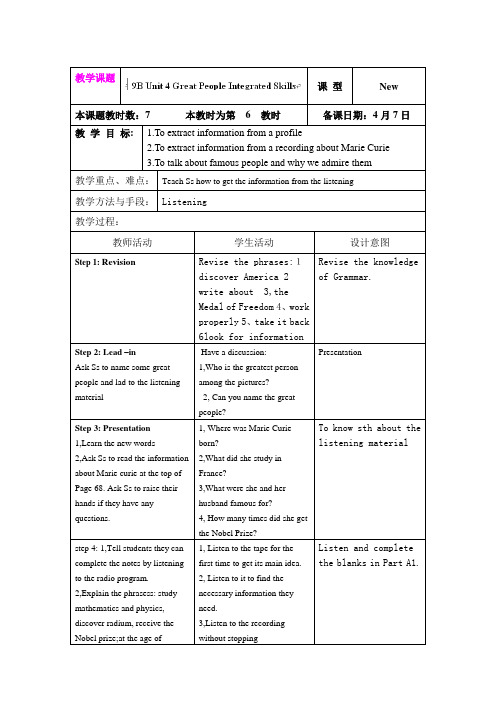Unit 4 Great people(要点点击 3)同步素材(文字版)(牛津译林版九年级下册)
- 格式:doc
- 大小:71.00 KB
- 文档页数:10



Born in 1930, Neil A. Armstrong, a United States astronaut, was the first person to set foot on the moon. On July 20, 1969, Armstrong and Buzz Aldrin landed the Apollo 11 lunar module Eagle on the moon. Armstrong left the module and explored the lunar surface. Upon taking his first step onto the moon, he said: "That's one small step for a man, one giant leap for mankind." But the word a was lost in radio transmission.Armstrong was born on Aug. 5, 1930, on his grandparents' farm in Auglaize County, Ohio. He moved with his family to several Ohio communities before they settled in Wapakoneta when Neil was 13 years old. Armstrong developed an interest in flying at an early age. His love of airplanes grew when he went for his first plane ride in a Ford Tri-Motor, a "Tin Goose," at the age of 6. From then on, he was fascinated by aviation.In 1947, Armstrong entered Purdue University. He began studies in aeronautical engineering. But in 1949, the United States Navy called him to active duty. Armstrong became a Navy pilot and was sent to Korea in 1950, near the start of the Korean War. In Korea, he flew 78 combat missions in Navy Panther jets.In 1952, Armstrong returned to Purdue. He earned a bachelor's degree in aeronautical engineering there in 1955.Armstrong was a civilian test pilot assigned to test the X-15 rocket airplane before becoming an astronaut in 1962. He made his first space flight in 1966 on Gemini 8 with David R. Scott. The two men performed the first successful docking of two vehicles in space -- the Gemini 8 and an uninhabited Agena rocket.Armstrong resigned from the United States astronaut program in 1970. Also in 1970, he earned a master's degree in aerospace engineering at the University of Southern California. From 1971 to 1979, Armstrong was a professor of aerospace engineering at the University of Cincinnati. In 1986, he was named vice chairman of a presidential commission investigating the breakup of the space shuttle Challenger. From 1982 to 1992, Armstrong served as chairman of the board of Computing Technologies for Aviation, a company that develops software for flight scheduling.。



Unit 4 Great peoplePronunciationTeaching Aims:To understand the importance of stress when speaking EnglishTo identify where stress falls in a wordTo place stress on the correct part of a word[Teaching Important Point:T o understand the importance of stress when speaking English]T o identify where stress falls in a wordTeaching Difficult Point:To place stress on the correct part of a wordTeaching Methods:Individual, pair or group work to make ev ery student work in class.Teaching Aids:The multimedia and the b lackboardTeaching Procedur es:1.Ask more able students what they want to find out when they read. Write ‘Stress ’on the Bb Underline the particular syllables.and put the stress in the right place .2.Ask students to look at the rules in the tables .Explain to students the syllables highl ighted in bold are the syllables they need to stress.3.Ask more able students to underline particular syllables4.Tell students to read them again.5.Randomly pick studen ts and ask them to say a word.Listen car efully to check if they have got the seress in the cor rect place.6.Ask more able students to read the extra words or phases.。
I. Language points1.These people are famous for the great things they did.这些人以他们所做的伟大的事而著名。
be famous for…以……而著名be famous as…作为……而著名Columbus is famous as a brave explorer.2.He has been interested in flying ever since he took his first flight at the age of six.他从六岁时第一次坐飞机起,就开始对飞行感兴趣。
ever since 从……以来II. Grammar定语从句(Attributive Clause )在复合句中充当定语的从句,叫作定语从句。
定语从句又称关系从句或形容词性从句。
定语从句修饰一个名词或代词,有时也可修饰一个句子。
定语从句通常置于它所修饰的名词或代词之后。
因此,这种名词或代词叫作先行词。
定语从句由关系词引出,关系词包括关系代词和关系副词。
关系代词有:that, which, who, whom, whose等;关系副词有:when, where, why等。
关系词除用于引导从句外,还代替先行词在从句中充当一定的语法成分,如:主语、宾语、定语或状语等。
关系词的选用,取决于先行词的意义和关系词在从句中的语法成分。
关系词在从句中起名词或代词作用则用关系代词,起状语作用则用关系副词。
在初中阶段,重点应掌握关系代词的用法。
关系代词是引导定语从句的第一类词,我们要知道它们的代替功能和句法作用。
关系代词可以代替先行词(被定语从句修饰的词),指人或物,并在从句中起主语、宾语和定语等作用。
功能代替人代替物代替人或物作用主语who which that宾语whom which that定语whose (of which) whose (of which)We don’t know the number of people who lost their homes in the 1906 earthquake.(先行词是people,主格关系代词who在从句中作主语)●Early European travelers to China took back to their own countries the seeds of fruit trees thatthey had not seen before.(先行词是fruit trees,关系代词that在从句中作宾语)●The man whom (that) you saw just now is our manager.(先行词是the man,关系代词whom在从句中作宾语)●Is there anyone here whose name is Wang Lin?(先行词是anyone,关系代词whose在从句中作定语)●The building whose roof we can see from here is a supermarket.(先行词是the building,关系代词whose在从句中作定语)●关系代词that可以代替一个是人或物的先行词,在定语从句中充当表语。
9B Unit 4 Great people(牛津英语教案)9BUnit4GreatpeoplewelcometotheunitDate:Step1warm-upactivities1ReadtheconversationbetweenEddieandHobo.checkunders tandingof‘invent’2Introducetheideaoffamouspeople.3.Asktwomoreablestudentstorole-playtheconversation.Step2PresentationAskmoreablestudents,2 AskstudentstolookatPartAandexplainthattheyarefamouspeople.andthengetstudentstowritethecorrectwordsunderthepic ture3Goaroundtheclasstocheckthatstudentshavewrittenthec orrectletters.4Askmoreablestudentstothinkofotherfamouspeople 5ReadthelistofwordsinPartBandcheckthatstudentsunders tandtheirmeanings.6ontheBb,nguagepointsStep3HomeworkLearnthelanguagepointsbyheart.2PreviewtheReadingPart.Notes:ReadingDate:.Revision1Reviewkeyvocabularyaccordingtothegeneralabilityoft heclass.Telltheclassaboutafamouspeople,afamousastro nautStep2Presentation1Dividetheclassintothreegroupsandallocateonearticle toeachgroup.whilestudentsskimthetextontheirown,askt hemtounderlinethewordstheydonotknow.Thengothroughth ewordsstudentshaveunderlined.2ontheBb,writetheheadings.Askeachgrouptogothroughag ainandfindwordsorexpressionstomatcheachheading.Invi testudentsfromeachgrouptocomeforwardandwritetheirwo rdsandexpressionsunderthecorrectheading.3writesomequestionsontheBbforstudentstocopyintheirb ooks.Presentation1Explainthecontextandcheckthatstudentsunderstandthe text.ThencompletePartB1inP56.Askstudentstoanswerthethem.2AskstudentstodoPartB1ontheirown.Encouragestudentst ochecktheiranswerwithapartner.Thenaskstudentstoread outatatime.3ExplainPartB2andaskstudentstofindeachdescriptionin thecorrespondingletter.askmoreablestudentstobriefly describeStep4Presentation1Dividetheclassintoteamsof4-5students.DoPartc1asaqu iz.Setatimelimit.2Askstudentstocorrectthefalsesentences.3ExplainthecontextofPartc2andcheckthatstudentsunder standtheidea.Acceptallreasonableanswers,.Step5LanguagepointsLearnLanguagepointsStep6HomeworkLearnthelanguagepointsbyheart.2PreviewtheVocabulary&GrammarPart.Notes:GrammarDate:Step1Presentation(GrammarPartA)1Tellstudentsthatadefiningrelativeclauseidentifiest henounbeforeit.Explainthatwecannottakeitoutofasentencebecauseitcontainsimportantinformati on.wecanuse“who““which“or“that”indefiningrelativeclause.Readtheexamplesonthepagean dinvitestudentstothinkofmoreexamples.2.ReadPartAStep2Presentation(GrammarPartB)1Itisagoodideatouseexamplesofdefiningrelativeclause,2Addoneortwostudentstoelicitexampleswithdefiningrel ativeclause.3AskstudentstocompleteinPartB1ontheirown.4AskstudentstocompleteinPartB2ontheirown.5AskstudentstocompletethesentencesinPartB3ontheirown andcompareanswerswithpartner.checkanswersorallywith theclass.6.GetthemtoactoutPartB3Step4LanguagepointsStep5DosomeexersicesFillintheblankswithwho,whom,which,whose,orthat..Aclockisamachine________tellspeoplethetime.2.Anurseisaperson________looksafterpeoplewhoareill.3.Thehouse________heislookingforisveryexpensive.4.Heistheperson_____________Imetintheparkyesterday.5.canyouhelpmefindtheperson________savedthegirl?6.Sheistheengineer_______workisconsideredtobethebesth ere.7.Theteam________wonthebasketballmatchisfromNo.27midd leSchool.8.Ihavelostthewatch_________myfathergavetometwoyearsa go.9.Theperson_____designswerethebestwasmr.king.correctthemistakesinthefollowingsentences..Imettheladyintheparkwhichshowedushowtocookdumplings.2.Hehastwosons,allofwhomaredoctors.3.Thewatcheswhichwasrepairedlastweekhavenotbeensentba ck.4.janeEvansisafamousdoctor,tothatthepresidentistalking.5.Thestudentwho’sfatherworksinyourcompanyissittingattheendoftheclassroom.6.Sheisthegirlwhomwaspraisedtheotherday.7.Shecan’ttellthereasonwhereshesoldthewatch.8.TheforeigntouristssaidthatHang-zhouwasthemostbeauti fulcitywhichtheyhadeverseen.9.Thisbook,thatonlyappearedayearago,hasbeentranslated intoEnglish.0.july7,1937isadaywhenthechinesepeopleandthejapanesep eoplewillneverforget.choosethebestanswer.Thisisthemountainvillage__wevisitedtheotherday.A.whichB.inwhichc.whereD.when2.Achild__parentsaredeadiscalledanorphan.A.whichB.hisc.whoseD.with3.ShethoughtIwastalkingaboutherdaughter,___,infact,Iw astalkingaboutmydaughter.A.whomB.wherec.whichD.while4.Thegentleman___youtoldmeyesterdaywasathief.A.whoB.aboutwhomc.whomD.withwhom5.Thedoctor___isleavingforAfricanextmonth.A.thenurseistalkingtohimB.whomthenurseistalkingc.whomthenurseistalkingtoD.whothenurseistalking6.All__isneededisasupplyofoil.A.thethingB.thatc.whatD.which7.Finally,thethiefhandedeverything___hehadstolentothe police.A.whichB.whatc.whateverD.that8.Achemist’sshopisashop___sellsmedicine.A.whoB.whichc.whereD.inwhich9.Thestudents___donotstudyhardwillnotpasstheexaminati on.A./B.whoc.whichD.they0.Hetoldusaboutthethingsandpersons____hemetduringhiss tayinginEngland.A.whichandwhoB.whichc.whoD.that`Step6HomeworkLearnthelanguagepointsbyheart.2PreviewtheIntegratedskillsPart.Notes:IntegratedskillsDate:Step1Presentation(IntegratedskillsA)1GetstudentstoreadPartA1andthendotheexecises2Invitestudentstotalkaboutmariecurie.3Playtherecording.Studentslistencarefullyandcomplet ethesenteneswithcorrectwordsinPartA3.4Askstudentstoreadout.Readthecompletedtexttocheckthecorrectanswers.5PlaytherecordingforPartA3andaskstudentstocomplete. Gothroughonpage65again.Readthecompletedtext.Step2Presentation(IntegratedskillsB)1closethebooksandlistentomewhileIreadtheconversatio n.Askstudentstorepeatthesentencesastheyhearthem.2Askstudentstopracticetheconversationinpairsandthen changeroles.Step3LanguagepointsStep4HomeworkLearnthelanguagepointsbyheart.2PreviewtheStudyskills,maintask&checkoutPart.Notes:PronunciationDate:Step1Presentation(Pronunciation)1Askmoreablestudentswhattheywanttofindoutwhentheyread.write‘Stress’ontheBbUnderlinetheparticularsyllables.andputthestressinth erightplace.3Askmoreablestudentstounderlineparticularsyllables 5Tellstudentstoreadthemagain,.Step2Languagepoints(Pronunciation)Notes:maintaskDate:Step1Presentation(maintask)1Explainthecontextofenteringawritingcompetitionofag reatperson.Ifpossible,findoutaboutsimilarwriting.2skstudentstolookatAmy’snotesinPartA.3Remindstudentsthatwhenwetakenotes,wedon’tneedtowriteincompletesentences---wejustneedtowritedownthekeywords.4Encouragestudentstouseavarietyofwordstoavoidrepetit ion.5AskstudentstoreadDaniel’sarticleinPartBontheirown.Thenaskgeneralquestionsto checkcomprehension.6AskstudentstowriteaagreatpersonusingtheirnotesinPa rtB,Amy’sarticleasamodelandtheplaninPartc.Step2Languagepoints(maintask)Notes:checkoutDate:Step1Presentation(checkout)1Tellstudentsthattheywillbeabletochecktheiruseofwho whichorthat.,adefiningrelativeclausetheyhavelearned intheunitbydoingPartA.2Askstudentstoreadthroughitandcompletetheconversati on.3Tellstudentsthattheyneedtoselectthecorrectwordstof itthecontextofthesentencesinthediaryentryinPartB.Se tatimelimit.Step2Languagepoints(checkout)Step3HomeworkLearnthelanguagepointsbyheart.2PreviewUnit2.Notes:。
1. Mission Control thought it was better to be safe than sorry, so they ordered Armstrong to cut the flight short, and he successfully brought the spacecraftdown into the western Pacific Ocean.地面指控中心出于安全方面的考虑,命令阿姆斯特朗缩短飞行,他成功地将飞船降落在西太平洋上。
★order用作动词,意为“命令”“指控”“指示”“吩咐”,后可接名词或代词,常用order sb. to do sth. 结构。
如:①The chairman ordered silence. 主席要大家安静。
②I’m not asking you to do your homework, I’m ordering you.我不是在请求你做作业,我是命令你去做。
③The doctor ordered him to stay in bed. 医生吩咐他卧床休息。
④The boss ordered us to finish the work ahead of time. 老板命令我们提前完成任务。
⑤The teacher ordered the plan to be carried out without delay. 老师命令立刻实施计划。
★order后接宾语从句时,从句中要用虚拟语气,即“should +动词原形”,其中should可以省略。
①The doctor ordered the patient (should) be operated on at once.医生命令立即给这个病人做手术。
②The doctor ordered that I (should) take a rest for a month.医生指示我要休息一个月。
③He ordered that the work (should) be started at once.他命令立即开始工作。
④It is ordered that litter (should) not be thrown everywhere.有人命令不准乱扔垃圾。
★order还可以与表示方向的副词或介词短语连用。
如:①He ordered me away. 他命令我走开。
②The policeman ordered the beggar our of the shop.警察命令那个乞丐离开店铺。
③We were ordered back to school. 我们受命返回学校。
★order用作动词,还可以表示“订购”“点(菜)”的意思。
如:①I’ve ordered a new carpet from the shop. 我已向商店订购了一块新地毯。
②The shop didn’t have the book I wanted, so I ordered it.那家商店没有我要的那本书,所以我订了一本。
③Are you ready to order yet, sir? 先生,您可以点菜了吗?④I’ve ordered you a glass of beer. 我已经给你叫了一杯啤酒。
★order用作可数名词,意为“命令”“指示”“吩咐”。
如:①All of you must obey my orders. 你们都必须服从我的命令。
②I have orders to search your room. 我奉命搜查你的房间。
③He gave orders that the work (should) be done at once.他下令那工作要立刻完成。
④You must take orders from your boss. 你们必须接受老板的指示。
【注】by order of (= under the orders of)意为“奉……之命”;under orders意为“奉命”。
如:①They attacked by order of the officer. 他们奉军官命令攻击。
②The ship left under orders to sail to the Pacific. 这艘船奉命驶向太平洋。
★order用作可数名词,还可表示“订购”“订货”“订单”“点菜”。
如:①They sent the factory an order for 100 TV sets.(= They sent an order with the factory for 100 TV sets.)他们向工厂订购了100台电视机。
②He received a large order for coal. 他收到了许多购煤的订货单。
③He gave the bookstore an order for the book. 他向书店订购了那本书。
④May I have your order, please? (在餐馆)请问您要点什么?★order用作不可数名词,意为“顺序”“次序”。
如:①The letters are arranged in order of importance.这些书信是按重要性排列的。
②The boy can numbers in order. 那男孩能照顺序数数字。
★order用作不可数名词,还可以表示“整齐”“井然有序”“状况正常”。
如:①The room is in bad order. 房间里乱七八糟。
②You must put things in order before leaving the office.下班之前你必须把东西整理好。
③The young teacher finds it hard to keep his classes in order.这位年轻的教师觉得很难维持课堂秩序。
④We are glad to find everything is in good order.我们很高兴发现一切情况良好。
★out of order意为“出了毛病”“发生故障”“不按顺序”。
如:①I couldn’t ring you up because the telephone was out of order.我没法打电话给你,因为电话机坏了。
②These paper are all out of order. 这些文件都放得乱七八糟。
★in order to do sth. 意为“以便”“为了”。
如:①He stood on the chair in order to take the book on the top.他站在椅子上以便从书架最上层把那本书拿下来。
②We started early in order to arrive before dark.为了在天黑之前到达,我们早早就动身了。
③I walked quietly in order not to wake the child.为了不弄醒那孩子,我走得很轻。
★in order that意为“为了”“为了……起见”。
后接从句。
如:①They got up earlier in order that they could catch the early bus.他们早早起来是为了赶上早班汽车。
②We used the computer in order that we might save time.我们使用计算机是为了节省时间。
③He hurried through his work in order that he could catch the train.他匆匆把工作做完是为了能赶上火车。
【注】on order that引导的目的状语从句中,谓语通常用情态动词may, might, can, could。
2. successfully的用法★successfully用作副词,意为“成功地”“圆满地”“顺利地”。
如:①He passed the driving test successfully. 他成功地通过了驾驶考试。
②They landed the spacecraft on the Moon successfully.他们成功地将宇宙飞船降落在了月球上。
③They held the concert very successfully.他们非常圆满地举办了那场音乐会。
④They finished the task very successfully. 他们顺利地完成了任务。
★successful用作形容词,意为“成功的”“有成就的”。
如:①The performance was successful. 演出很成功。
②That was a successful experiment. 那是一次成功的试验。
③He was successful in finishing the work ahead of time.他成功地提前完成了工作。
④My uncle is successful in his business. 我叔叔事业有成。
★success用作不可数名词,意为“成功”“好结果”,后面常跟in引导的介词短语。
如:①Hard work is the key to success. 勤奋是取得成功的钥匙。
②Failure is the mother of success. 失败是成功之母。
③We had no success in finding a new flat. 我们没有找到新的寓所。
④They had success in solving the problem. 他们顺利地解决了这一问题。
★success用作可数名词,意为“成功之事”“成功者”“受欢迎”。
如:①The fashion show was a great success. 这次时装表演非常成功。
②I’m sure that he will make a success of his new business.我确信他将使他的新企业获得成功。
③He was a success in business. 他在事业上是位成功者。
④He was a great success as a teacher. 作为一名教师,他是很成功的。
【注】“祝你成功!”我们应说I wish you success! success前面不能加冠词a。
★succeed用作动词,意为“成功”,一般用作不及物动词,常用于succeed in sth. / doing sth.结构,表示“在某方面取得成功”;succeed后接as短语表示主语的身份或职务。